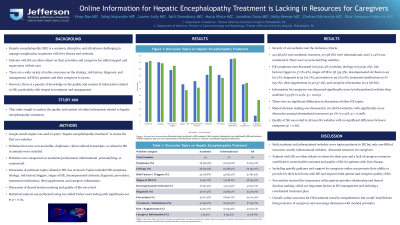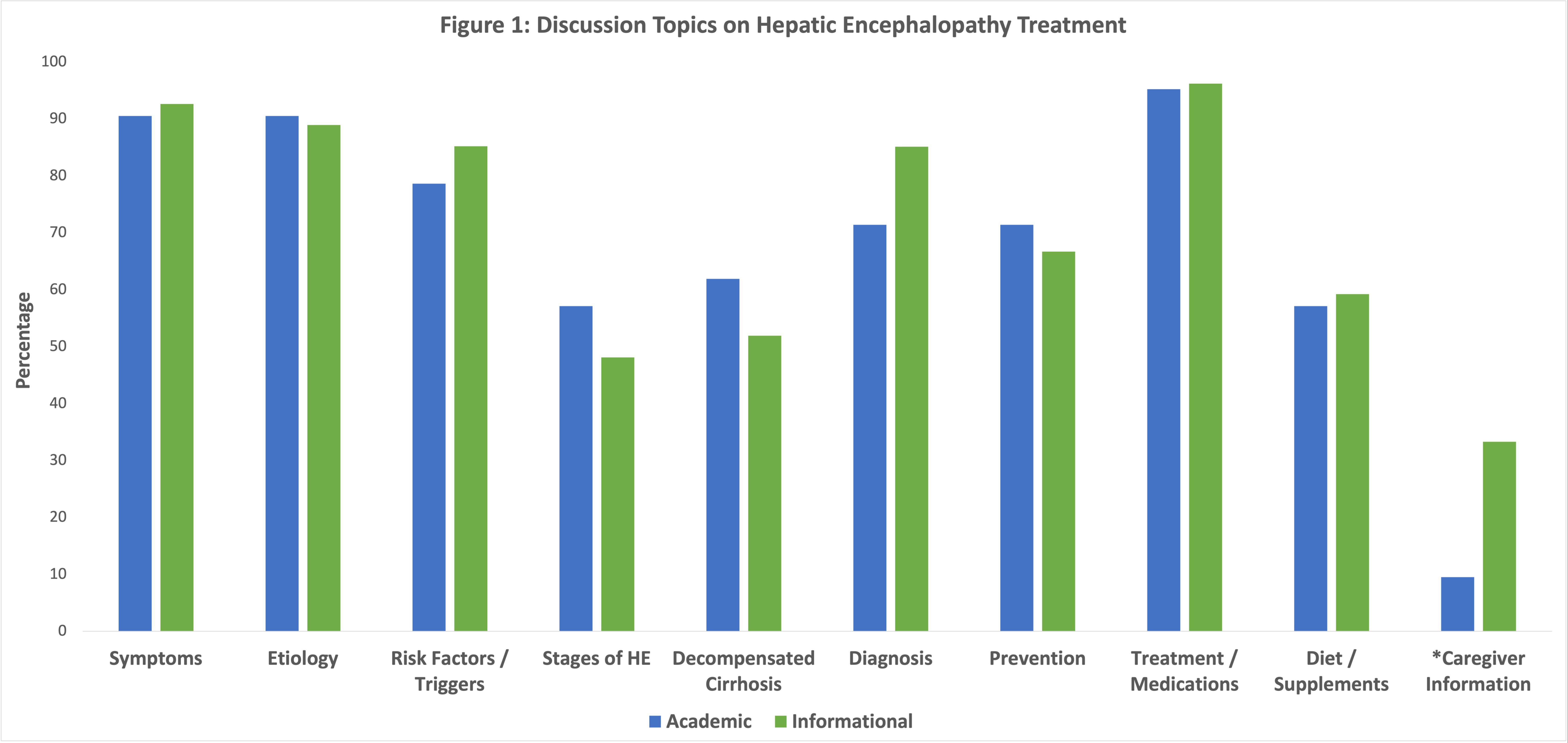Back


Poster Session E - Tuesday Afternoon
Category: Liver
E0467 - Online Resources for Hepatic Encephalopathy Treatment Are Lacking in Information for Caregivers
Tuesday, October 25, 2022
3:00 PM – 5:00 PM ET
Location: Crown Ballroom

Has Audio

Vinay Rao, MD
Thomas Jefferson University Hospital
Philadelphia, PA
Presenting Author(s)
Vinay Rao, MD1, Sahaj Mujumdar, MD1, Lauren T. Lally, MD1, Salil Chowdhury, MD1, Maria Winte, MD1, Jonathan Gross, MD1, Kelly Keenan, MD2, Chelsea Edirisuriya, MD1, Dina Halegoua-DeMarzio, MD1
1Thomas Jefferson University Hospital, Philadelphia, PA; 2Thomas Jefferson University Hospital, Ballwin, PA
Introduction: Hepatic encephalopathy (HE) is a common and oftentimes challenging complication in patients with liver disease. There are a wide variety of online resources on the management of HE for patients and their caregivers to access. This study sought to analyze the quality and content of online information related to HE treatment.
Methods: Google search engine was used to query “hepatic encephalopathy treatment” to access the first 100 websites. Websites that were non-accessible, duplicates, videos without transcripts or about animals were excluded. Websites were categorized as academic/professional, informational, personal/blog or commercial. Discussion of pertinent topics related to HE treatment was reviewed. Discussion of shared decision making and quality of life was noted. Statistical analysis was performed using two-tailed Fisher exact testing with significance set at p< 0.05.
Results: Seventy of 100 websites met the inclusion criteria. 42(60.0%) were academic, 27(38.6%) informational and 1(1.4%) commercial. There were no personal/blog websites. HE symptoms were discussed in 64(91.4%) websites, etiology in 63(90.0%), risk factors/triggers in 57(81.4%), stages of HE in 38(54.3%), decompensated cirrhosis in 40(57.1%), diagnosis in 53(75.7%), prevention in 49(70.0%), treatment/medications in 67(95.7%), diet/supplements in 40(57.1%) and caregiver information in 13(18.6%). Information for caregivers was discussed significantly more in informational websites than in academic (33.3% vs 9.5%; p=0.025). There was no significant difference in discussion of other topics between the two categories. Shared decision making was noted in 16(18.6%) of websites with significantly more discussion among informational resources (40.7% vs 11.9%; p=0.008). Quality of life was noted in 28(40.0%) of websites with no significant difference between categories.
Discussion: Our study showed that both academic and informational websites cover topics pertinent to the treatment of HE but that only one-fifth of resources discussed information for caregivers. Given that patients with HE are often reliant on others for their care, a lack of caregiver resources presents as an area to improve quality of life for this patient population. Similarly, few articles stressed the importance of the patient-provider relationship, which is particularly important in HE treatment. Overall, online resources for HE treatment must be comprehensive but also inclusive of caregivers and encourage discussion with medical providers.

Disclosures:
Vinay Rao, MD1, Sahaj Mujumdar, MD1, Lauren T. Lally, MD1, Salil Chowdhury, MD1, Maria Winte, MD1, Jonathan Gross, MD1, Kelly Keenan, MD2, Chelsea Edirisuriya, MD1, Dina Halegoua-DeMarzio, MD1. E0467 - Online Resources for Hepatic Encephalopathy Treatment Are Lacking in Information for Caregivers, ACG 2022 Annual Scientific Meeting Abstracts. Charlotte, NC: American College of Gastroenterology.
1Thomas Jefferson University Hospital, Philadelphia, PA; 2Thomas Jefferson University Hospital, Ballwin, PA
Introduction: Hepatic encephalopathy (HE) is a common and oftentimes challenging complication in patients with liver disease. There are a wide variety of online resources on the management of HE for patients and their caregivers to access. This study sought to analyze the quality and content of online information related to HE treatment.
Methods: Google search engine was used to query “hepatic encephalopathy treatment” to access the first 100 websites. Websites that were non-accessible, duplicates, videos without transcripts or about animals were excluded. Websites were categorized as academic/professional, informational, personal/blog or commercial. Discussion of pertinent topics related to HE treatment was reviewed. Discussion of shared decision making and quality of life was noted. Statistical analysis was performed using two-tailed Fisher exact testing with significance set at p< 0.05.
Results: Seventy of 100 websites met the inclusion criteria. 42(60.0%) were academic, 27(38.6%) informational and 1(1.4%) commercial. There were no personal/blog websites. HE symptoms were discussed in 64(91.4%) websites, etiology in 63(90.0%), risk factors/triggers in 57(81.4%), stages of HE in 38(54.3%), decompensated cirrhosis in 40(57.1%), diagnosis in 53(75.7%), prevention in 49(70.0%), treatment/medications in 67(95.7%), diet/supplements in 40(57.1%) and caregiver information in 13(18.6%). Information for caregivers was discussed significantly more in informational websites than in academic (33.3% vs 9.5%; p=0.025). There was no significant difference in discussion of other topics between the two categories. Shared decision making was noted in 16(18.6%) of websites with significantly more discussion among informational resources (40.7% vs 11.9%; p=0.008). Quality of life was noted in 28(40.0%) of websites with no significant difference between categories.
Discussion: Our study showed that both academic and informational websites cover topics pertinent to the treatment of HE but that only one-fifth of resources discussed information for caregivers. Given that patients with HE are often reliant on others for their care, a lack of caregiver resources presents as an area to improve quality of life for this patient population. Similarly, few articles stressed the importance of the patient-provider relationship, which is particularly important in HE treatment. Overall, online resources for HE treatment must be comprehensive but also inclusive of caregivers and encourage discussion with medical providers.

Figure: Figure 1: Discussion Topics on Hepatic Encephalopathy Treatment (* denotes a statistically significant difference in discussion of topic among website categories)
Disclosures:
Vinay Rao indicated no relevant financial relationships.
Sahaj Mujumdar indicated no relevant financial relationships.
Lauren Lally indicated no relevant financial relationships.
Salil Chowdhury indicated no relevant financial relationships.
Maria Winte indicated no relevant financial relationships.
Jonathan Gross indicated no relevant financial relationships.
Kelly Keenan indicated no relevant financial relationships.
Chelsea Edirisuriya indicated no relevant financial relationships.
Dina Halegoua-DeMarzio indicated no relevant financial relationships.
Vinay Rao, MD1, Sahaj Mujumdar, MD1, Lauren T. Lally, MD1, Salil Chowdhury, MD1, Maria Winte, MD1, Jonathan Gross, MD1, Kelly Keenan, MD2, Chelsea Edirisuriya, MD1, Dina Halegoua-DeMarzio, MD1. E0467 - Online Resources for Hepatic Encephalopathy Treatment Are Lacking in Information for Caregivers, ACG 2022 Annual Scientific Meeting Abstracts. Charlotte, NC: American College of Gastroenterology.
